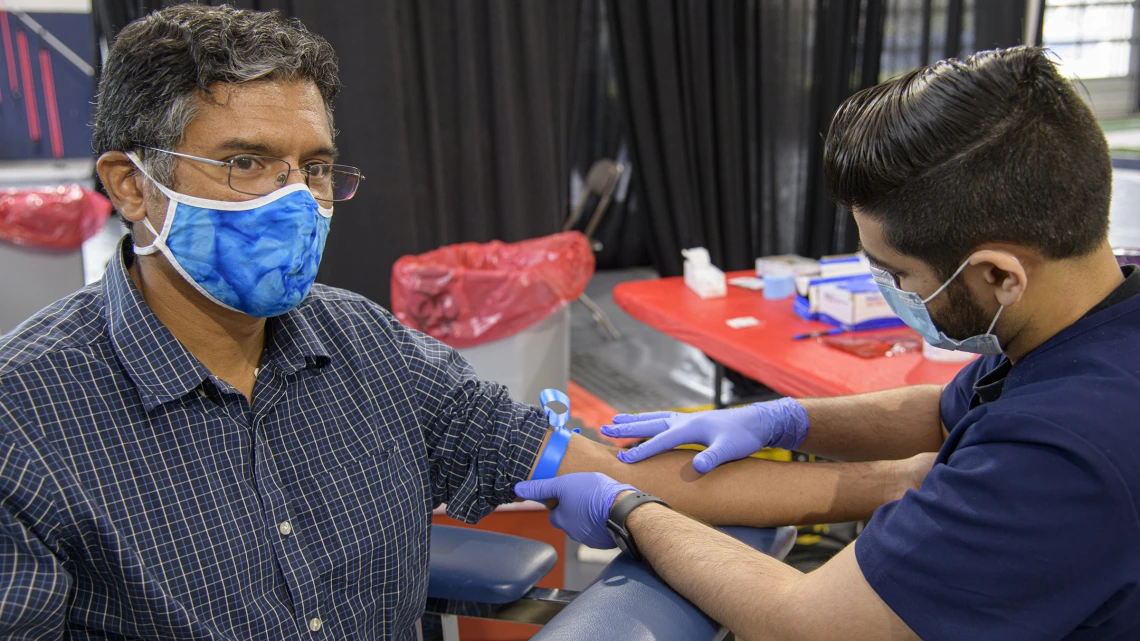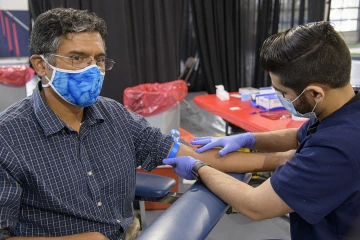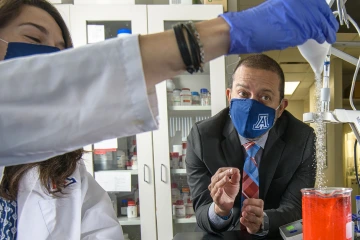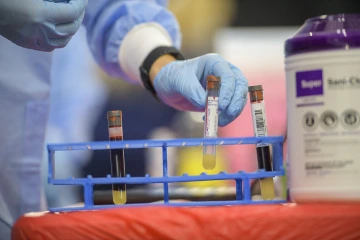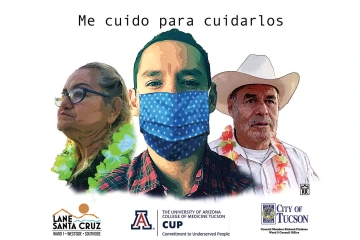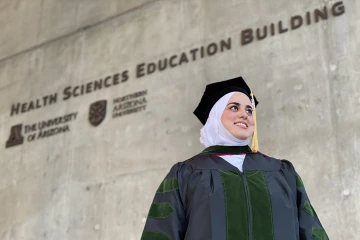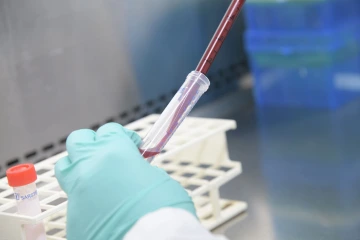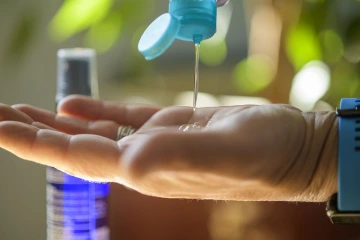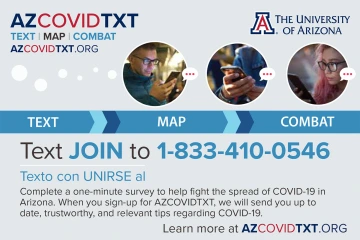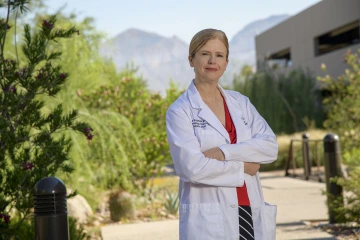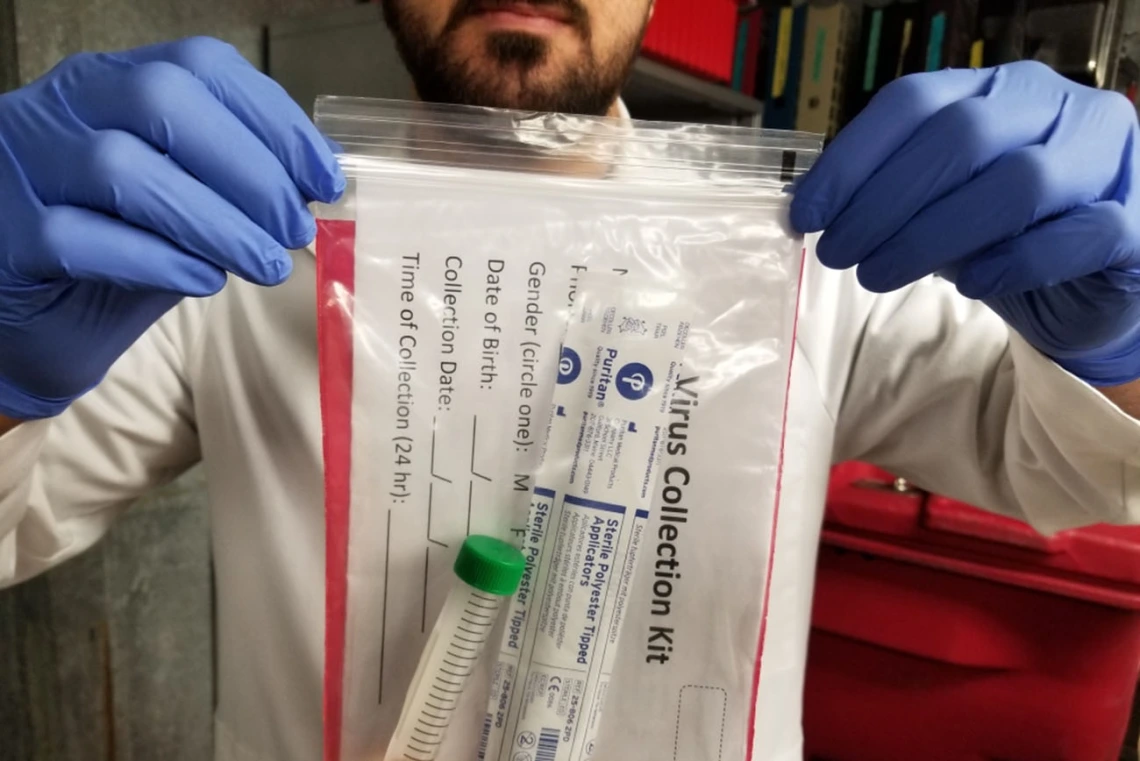COVID-19, social distancing, masks, antibody tests and the quest for a vaccine dominated the media this year, and University of Arizona Health Sciences researchers contributed to the global pandemic response in myriad ways.
From research to clinical trials and public outreach, UArizona Health Sciences faculty, physicians, scientists, staff and students made their mark during the largest public health crisis in a century. Not surprisingly, COVID-19 was a dominant theme among more than 225 Health Sciences news items posted in 2020.
Here are the Top 10 UArizona Health Sciences releases of the year:
Researchers in the UArizona
College of Medicine – Tucson’s Department of Immunobiology led a study that showed antibodies for SARS-CoV-2, the virus that causes COVID-19, persist for at least seven months. “We clearly see high-quality antibodies still being produced five to seven months after SARS-CoV-2 infection,” said
Deepta Bhattacharya, PhD, an associate professor. Dr. Bhattacharya and J
anko Nikolich-Žugich, MD, PhD, professor and head of the Department of Immunobiology, led the research team.
Research conducted in the College of Medicine – Tucson’s Department of Pharmacology found that the SARS-CoV-2 virus causes pain relief when it binds to the receptor neuropilin-1. The study offers a possible explanation for the unrelenting spread of COVID-19. Based on this study, Professor
Rajesh Khanna, PhD, who is affiliated with the UArizona
Comprehensive Pain and Addiction Center, will be examining neuropilin as a new target for non-opioid pain relief.
A partnership between the UArizona and the state expanded eligibility for antibody testing to essential workers. The antibody test, developed by researchers at UArizona Health Sciences, determines who has been exposed to and developed an immune response against COVID-19. It was first offered to health care workers and first responders and later became available to the general public.
Four College of Medicine – Tucson students led a Spanish-language awareness campaign for social distancing, masking and other hygiene measures to retard the spread of COVID-19. “I was talking to classmates later about still seeing a lot of non-compliance or lack of social distancing in grocery stores, Walmart’s and places like that,” said
Cazandra Zaragoza, MD, who was a fourth-year medical student at the time. “We realized there really weren't any posters and things in Spanish and, if there are, they have a lot of text and it's not very visual. It's not very appealing.”
Senior medical students at the College of Medicine – Tucson and UArizona
College of Medicine – Phoenix were given the option to graduate early to begin their residency rotations and join the fight against COVID-19. “Given the extraordinary times in which we find ourselves, and rapidly growing burden the pandemic is placing on our health care system, we stand in admiration of our students who wish to pursue this option,” said College of Medicine –
Phoenix Dean Guy Reed, MD.
The first clinical study to evaluate green light exposure as a therapy for people with chronic migraine resulted in about a 60% reduction in the pain intensity of the headache phase and number of days per month people experienced migraine headaches. Researchers from the College of Medicine – Tucson said green light therapy, which has no associated side effects, was also associated with an improved quality of life.
With $3.5 million in funding from the state, the UArizona moved ahead with plans to produce blood tests to detect COVID-19 antibodies for Arizona’s front-line workforce of about 250,000 people. University of Arizona President
Robert C. Robbins, MD, announced the university also intended to test all of its 45,000 students and 15,000 faculty and staff.
A UArizona
College of Pharmacy advisory from the Arizona Poison and Drug Information Center reported a handful of hospitalizations in Northern Arizona due to the ingestion of what was believed to be homemade hand sanitizer containing methanol. Methanol is a type of alcohol used to create fuel, solvents and antifreeze. The colorless liquid is volatile, flammable and – unlike ethanol – poisonous when consumed.
A team led by researchers in the UArizona
Mel and Enid Zuckerman College of Public Health launched
AZCOVIDTXT, a two-way texting system to gather and provide valuable information to track the COVID-19 pandemic in Arizona and identify areas where more resources may be needed. The free service allows people to voluntarily report household members’ health statuses, give and get feedback, and learn about available resources and services, research opportunities and coping methods and tools.
A UArizona Cancer Center phase 1 clinical trial sponsored by Moderna Inc. investigated the safety and effectiveness of a personalized cancer vaccine in combination with immunotherapy drug Pembrolizumab. The study reported a 50% response rate for patients with head and neck cancer in its preliminary data.
